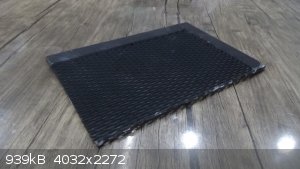HamiltonMaya
Harmless

Posts: 11
Registered: 21-9-2020
Member Is Offline
|
|
Sealing the edges of a Perchlorate Cell Anode
Hi all, I searched for info on this but couldn't easily find any, and the perchlorate anode threads are all huge.
I've got my hands on a titanium substrate lead dioxide anode, and want to see if I can make sodium perchlorate with it. I don't have any sodium
chlorate right now, so I'll be running it straight through from sodium chloride.
The problem is that the anode is second-hand (although apparently unused), and the last owner cut it into several pieces. Two of the edges are fine,
but the substrate is exposed at the other two edges. I'm concerned that this will cause damage to the substrate or separation of the coating.
Has anyone had any success with sealing vulnerable components in a chlorate/perchlorate cell?

|
|
|
Heptylene
Hazard to Others
  
Posts: 319
Registered: 22-10-2016
Member Is Offline
Mood: No Mood
|
|
I don't think sealing is needed. Titanium passivates when used as anode, so the parts not coated by lead dioxide should passivate without causing
issues.
|
|
|
mysteriusbhoice
Hazard to Others
  
Posts: 477
Registered: 27-1-2016
Member Is Offline
Mood: Became chemistry catboy Vtuber Nyaa
|
|
well titanium will passivate so it wont really destroy much to my knowledge but theres little to nothing that can stop perchlorate and ozone from
fking it up not even PVC glue will work!! as its actually porous when exposed to water.
epoxy also degrades but polyolefins might work so I imagine you can probably seal it with carefully heated polythene but really theres no need to do
anything.
whered u buy it  link plsss link plsss
[Edited on 23-9-2020 by mysteriusbhoice]
|
|
|
HamiltonMaya
Harmless

Posts: 11
Registered: 21-9-2020
Member Is Offline
|
|
Thanks for the quick answers, I'm going to start building a cell at the weekend.
I got the anode through a friend, sadly I don't have a reliable commercial source to share.
|
|
|
HamiltonMaya
Harmless

Posts: 11
Registered: 21-9-2020
Member Is Offline
|
|
Does anyone know a quick way to approximate the surface area of an anode with this many holes in?
|
|
|
B(a)P
International Hazard
    
Posts: 1139
Registered: 29-9-2019
Member Is Offline
Mood: Festive
|
|
The mesh is formed by punching slots then stretching the sheet into a mesh.
You can get an approximation by measuring the length then measuring the thickness of the mesh (gaps between the slots) and counting how many. Then
multiple the number of them by their width, then multiply that by the total width. You then need to decide how much area the inside of the slots have,
or you can ignore that and get a conservative value for your maximum current (if that is what you are calculating).
Make sense?
|
|
|
yobbo II
National Hazard
   
Posts: 777
Registered: 28-3-2016
Member Is Offline
Mood: No Mood
|
|
Straight MMO has a surface area of 1.1 times the length by breath.
|
|
|
Fantasma4500
International Hazard
    
Posts: 1682
Registered: 12-12-2012
Location: Dysrope (aka europe)
Member Is Offline
Mood: dangerously practical
|
|
i know this isnt what youre asking about, but you dont really need to have a gas outlet for a cell, if you use plastic plate on a flat mouth jar the
water vapors will seal it up well, and to my experience adding a bit of NaOH will balance it in favor of absorbing chlorine gas more effectively, i
never had issues with chlorine smell.
also as for surface area of expanded mesh i wrote this up as i received some very thin titanium mesh
titanium mesh
50mm = 21mm solid titanium
50x165mm = 5/2 40% 82.5cm3 = 33cm2 x 2 = 66cm2
so, 5 to 2 or 10 to 4 might be a realistic guess, regardless MMO is pretty stable.
|
|
|